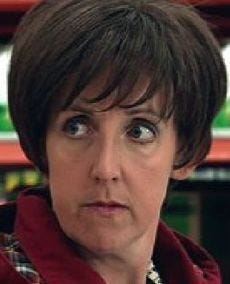Beyond Gender – Episode 0: How Did We Get Here?
In this first episode of Beyond Gender, hosts Stella O’Malley, Mia Hughes, and Bret Alderman discuss why they launched the podcast and explore how beliefs about gender have changed over time. They examine why so many young people are questioning their identity, the role of media and medicine, and the difficulty of standing up for basic truths in today’s world.
But how did we get here? One unexpected answer: Hayley Cropper.
Hayley Cropper: A Fictional Character with Real-World Impact
Hayley Cropper, the first transgender character in Coronation Street, a British soap opera, shaped UK public attitudes on trans rights and influenced major legal changes. Between 1998 and 2014, Hayley was played by Julie Hesmondhalgh, a biological female. Unlike modern trans characters played by trans actors, Hayley was portrayed by a woman, making her more sympathetic and widely accepted by British audiences.
At a time when most had never met a transgender person, millions watched Hayley face discrimination, fight for legal recognition, and win public sympathy. Her storyline reflected real-life legal battles and helped normalize ideas that were previously contested in UK law.
The Gender Recognition Act 2004, which allowed legal sex changes in the UK, was directly influenced by Hayley’s character. In October 1998, Labour MP Lynne Jones praised Coronation Street in an Early Day Motion, urging the government to grant trans people the right to marry. (Read here: UK Parliament).
Jones had advocated for trans rights since 1992, founding the Parliamentary Forum on Transsexualism in 1994. (More on her advocacy: Lynne Jones MP). In 2014, journalist Stuart Jeffries wrote that Hesmondhalgh’s portrayal of Hayley “helped catalyse a national debate that led to the Gender Recognition Act.”
Hayley Cropper and UK Law Changes
Hayley’s struggle to marry Roy Cropper highlighted the legal barriers for same-sex couples in the UK. The Civil Partnership Act 2004, passed alongside the Gender Recognition Act, granted legal recognition to same-sex couples.
In 2013-2014, her final storyline tackled assisted suicide. Diagnosed with pancreatic cancer, Hayley chose to end her life on her own terms, dying in Roy’s arms. This coincided with UK debates on assisted dying, and Hesmondhalgh later became a supporter of the Assisted Dying Bill currently before Parliament.
Media Influence, Trans Activism, and Institutional Change
It is impossible to quantify Hayley Cropper’s full impact on UK law, but she was instrumental in shifting public opinion. Coronation Street worked with trans pressure groups like Press for Change founded by Christine Burns and Stephen Whittle to ensure Hayley’s storyline aligned with trans activism. Within a few months of Hayley’s first appearance, they recruited a "trans advisor," Annie Wallace (now a Hollyoaks cast member), to act as a script consultant.
By the time the Gender Recognition Act passed, British audiences had already spent years watching Hayley fight for legal recognition.
Julie Hesmondhalgh, a patron of Press for Change and Trans Media Watch, reinforced the cultural shift her character helped initiate. As she said on Loose Women in November 2019:
"That’s the way to change the world, be in someone’s living room, four times a week."
From Fiction to Reality
Hayley Cropper’s story was not just entertainment. It was a powerful tool of social change in Britain. A woman playing a man playing a woman helped soften UK public opinion, paving the way for legal and cultural shifts that continue to shape debates on gender identity, marriage equality, and assisted dying today. Stuart Jeffries, in an interview with Julie Hesmondhalgh, explains how her character helped catalyze a national debate that led to the 2004 Gender Recognition Act and how her final scene sparked discussion on assisted suicide.
How Our Hosts Got Here
As mainstream media shaped public understanding of gender worldwide, each host of Beyond Gender describes distinct moments that drew them into these complex debates:
Stella O'Malley
As a psychotherapist who experienced extreme gender issues as a child, Stella had always kept an eye on trans issues. In 2017, reading about Cyril Doty, a non-binary parent seeking a "U" gender marker for their baby, sparked her to write for Ireland's Sunday Independent - her first article requiring legal review. This led to her presenting the documentary Trans Kids: It's Time to Talk.
Another pivotal moment came when she read Janice Turner's article about Tara Wolf, "a 27-year-old male" who punched "Maria MacLachlan in the face," which she shared with a radio producer, calling it "the most insane article I've ever read in my life."
Mia Hughes
J.K. Rowling's December 19, 2019 tweet supporting Maya Forstater marked Mia's awakening, as she saw "absolute mayhem" and people "losing their minds" when Rowling supported "basic facts about humanity."
This led to her first viral thread in 2021 about "peaking" her woke Canadian friends with evidence about autogynephilia, homophobia in trans activism, and what she calls "the greatest medical scandal in the history of modern medicine."
Bret Alderman
Bret's understanding emerged through his academic work examining postmodernism and language in his book Eternal Youth and the Myth of Deconstruction, research he was conducting before recognizing its connection to gender ideology.
His moment of realization came in 2016 with the Caitlyn Jenner Vanity Fair cover and pronouns controversy, followed by Jordan Peterson's stance on compelled speech.
Stay Connected
If you've ever felt like something bigger is happening but struggled to make sense of it, Beyond Gender is for you. This podcast cuts through the noise with honest, thoughtful discussions about one of the most pressing topics of our time.
Next Episode
Why Smart People Believe Stupid Things with Gurwinder Bhogal
Premieres Friday, February 21 | 6:00 AM EST
Watch & Listen
New episodes every Friday on:
Follow Our Hosts
What did you think about this episode? Let us know in the comments!













Share this post